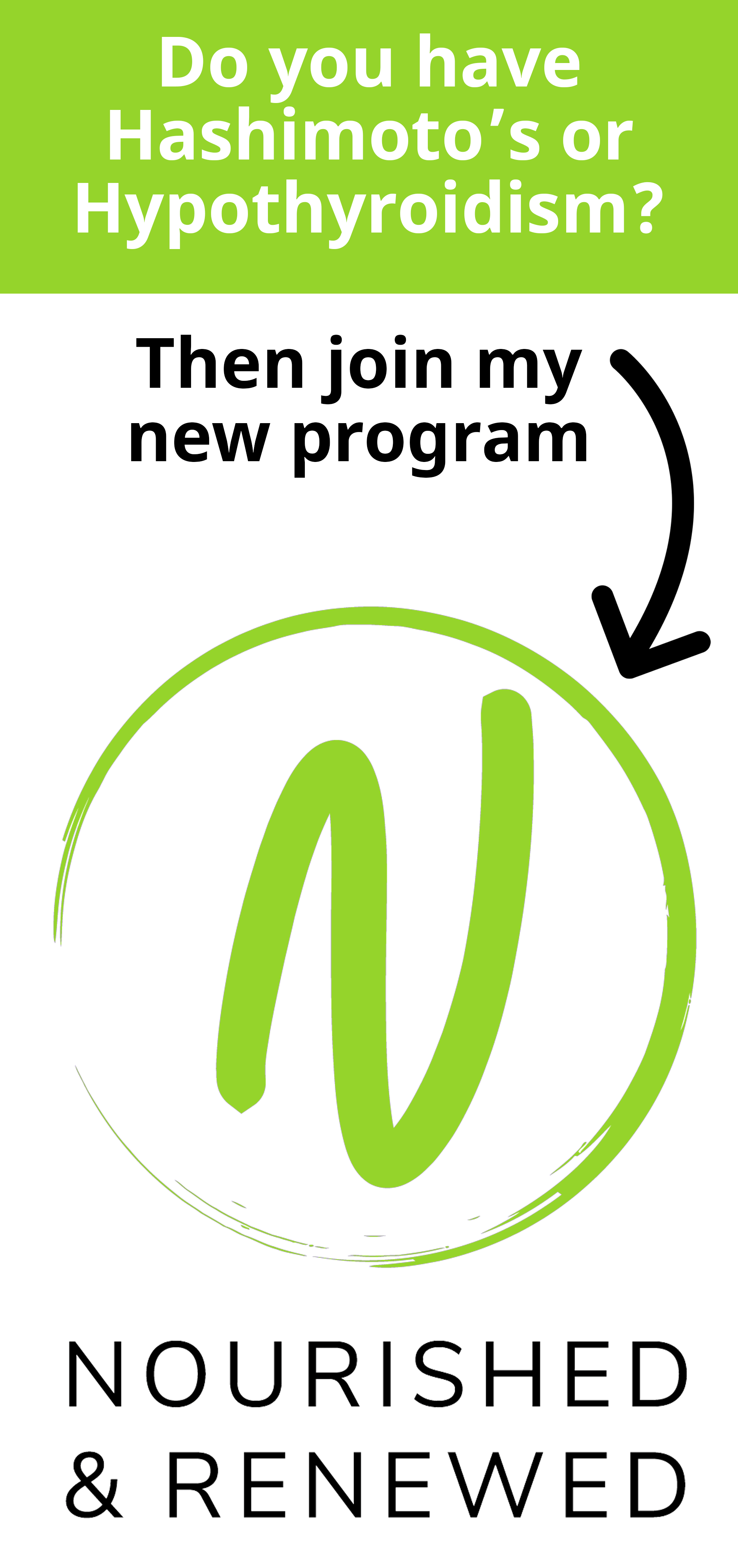There is something about hair loss that is a real blow to your self-esteem.
After all, doesn’t it feel great when someone compliments you on your hair?
But people with Hashimoto’s disease, like myself, are at risk of hair loss. Even those with non-Hashimoto’s thyroid disorders can experience this.
It can be scary and make you feel less feminine or masculine. And our hair is one of the first things people notice about us
This brings up so many questions:
What is the link between the thyroid and losing hair?
Will your hair grow back?
And the big one — What can be done to prevent hair loss especially if you have Hashimoto's? 
My Hashimoto's Diagnosis and My Own Experience With Unruly and Dry Hair
My hair has changed a lot over the years since my diagnosis with Hashimoto’s. The first time it really surprised me was when I suffered from postpartum thyroiditis after my son was born.
I did not lose my hair, but it became frizzy, unruly, dry, brittle, and even though I was only 32, I noticed my first grays.
Despite the other major challenges I faced at that time, one of the things I remember feeling most self-conscious about was the way my hair looked.
I felt like I had old-lady hair.
Luckily, I worked with a great stylist who gave my “old-feeling” hair new life in the interim. I knew it was going to take serious nutrition and care to bring back my beautiful mane.
The second time I dealt with hair changes was in 2018 after my heart surgery. I struggled with anemia due to a medication I had to take to prevent blood clots. (Turns out, I was probably very allergic to that medicine as my reaction was far from normal.)
Becoming quickly anemic, my iron and ferritin levels plummeted. More about iron in a bit, but what that period of my life taught me about Hashimoto’s and my hair was life-changing.
At the height of my anemic period, my hair was at its finest, sparsest, stringiest and grayest. I was afraid I was going to lose it all.
Luckily, it was simply one of my oldest and most favorite nutrition books which revealed the clues to help me get my hair healthy again.
Why Does Hashimoto’s Cause Hair to Fall Out?
If you’re reading this, you may already have received a diagnosis of Hashimoto’s or have an understanding of what it is.
But briefly, Hashimoto’s is an autoimmune disease in which the body’s immune system attacks the thyroid or thyroid proteins.
The gland is located in the Adam’s apple area of the neck and produces hormones that serve many functions. This includes regulating body temperature, metabolism and growth.
Like with many autoimmune diseases, we don’t fully understand why our bodies can turn on us in this way. But certain risk factors like genetics, environmental toxins and nutrient deficiencies can play a role.
Hair Loss vs. Brittle Hair
Hashimoto’s primary effect on hair is hair loss - meaning losing hair at the scalp. In fact thyroid disorders can additionally or alternatively cause hair to become brittle. It can mean hair is more prone to breakage.
Brittle, breakage-prone hair has been one of the hair + Hashimoto’s conditions I have struggled with most.
These may be two very different things but both can still lead to thinning hair just the same.
One study of Hashimoto’s patients found that about 63% of them reported having brittle hair, nearly as much as the 66% that experienced loss hair. This means that a majority of participants had both less hair and breakage.

The Thyroid’s Role in Hair Health
Hashimoto’s is the leading cause of hypothyroidism, which is when the thyroid gland is under-producing thyroid hormones.
Many with hypothyroidism notice significant hair changes.
But an overactive thyroid, hyperthyroidism, can also cause hair loss.
Adding to the confusion of it all, because of how long it may take to notice the loss of hair, many people are on medications for their thyroid disorders by the time they realize the problem with their hair and blame the medication.
Oh, and also medication can also be an additional problem. Fun, right?
But it appears that the thyroid hormones T3 and T4 stimulate in the hair follicle the production of keratin, which is key to the makeup of hair. These critical hormones also prolong the phase of growth in the “life cycle” of hair.

Interestingly enough, thyroid hormones also trigger the synthesis of melanin in hair, which gives it its color.
It’s not a symptom many people have heard of but premature graying can actually be a sign of a thyroid disorder, both hyper- and hypothyroid issues.
And now you know why - melanin!
How the Thyroid Communicates to the Hair
Take a minute to consider what’s called the hypothalamic-pituitary-thyroid (HPT) axis. I want to explain the way parts of these glands within the brain work synergistically with the thyroid.
The hypothalamus and the pituitary gland signal to the thyroid to secrete hormones that will stimulate cells’ mitochondria.
(Remember learning in grade school that the mitochondria is the powerhouse or “battery” of the cells?)
Well, mitochondria in the follicles of the hair cause cell production to increase, leading to stronger hair growth.
I know, this sounds majorly confusing. But if you break it down, it’s basically communication from the brain to the thyroid to the hair follicles.
And of course, if the thyroid is out of whack, it pretty much ruins that game of “telephone” by cutting out the middleman.
Hashimoto’s + Other Autoimmune Conditions Increases Risk of Hair Loss
Unfortunately, when you have an autoimmune disease like Hashimoto’s, you are at higher risk for other autoimmune disorders.
That can include alopecia areata, which causes hair loss in a localized pattern because the immune system attacks healthy hair follicles.
Other autoimmune diseases that can lead to hair loss include Celiac disease, lupus (hair loss occurs as a result of scarring) and polycystic ovarian syndrome (PCOS).
Read all about my own experience dealing with both Hashimoto’s and Celiac.

The Role of the Adrenal Glands & Stress on Hair Loss
An important thing to remember about the thyroid is that it works synergistically with other glands in the body. It is one reason why when you have one gland issue, you often have another, like a hormone imbalance or adrenal fatigue.
Adrenal fatigue occurs when the adrenal glands are asked to produce the stress hormone cortisol too much for too long.
For people who lead a highly stressful life (that’s waaaay too many of us) or don’t manage stress well (basically the rest of us), the adrenals run out of steam.
This can come from emotional stress, like dealing with struggles in your life like having Hashimoto’s (ahem), or physical stress, like the strain that having Hashimoto’s has on your body (ahem again).
So it may be no surprise that adrenal fatigue and thyroid issues can go hand in hand.
But on top of that all, adrenal fatigue can be another cause of hair loss. This may stem from the fact that cortisol is connected to our fight-or-flight response.
When we are in the mode, the body puts certain functions on the back burner to focus on survival.
This includes hair growth.

The Good News — Stunted Hair Growth Is Not Permanent
Reading all of this might be daunting and make you feel doomed. But the good news is that research shows that when thyroid hormones get back to being balanced, that hair growth also returns to normal.
Addressing possible nutrient deficiencies (which I’ll cover next) and balancing thyroid hormone levels with medications or diet and lifestyle changes or both can get those follicles functioning like normal again and reduce hair brittleness.
How Low Nutrients Add to the Hair Problem
There are a number of nutrients that when too low can add to the hair loss problem, many of which are unsurprisingly also associated with a dysfunctioning thyroid gland.
Iron Support Hair Growth
Iron deficiency has a strong link with hair loss specifically in premenopausal women and supplementing with iron can help slow down loss.
Ferritin, a blood protein that contains iron, may also be low both in hypothyroidism and those with hair loss.
Ferritin is stored, among other places, in hair follicles. When iron stores in the body get low, that ferritin may be called on to deliver iron to other areas of need. This results in leaving hair without the ferritin and in a weaker state.
Some doctors are satisfied with ferritin levels of at least 50ng/mL, but more and more functional doctors will tell you that for adequate amounts to support hair growth, you need at least 70ng/mL.
Personally, I’ve found that to be true as well.
I suggest getting the Ferritin + Iron + TIBC (Total Iron Binding Capacity) test through True Health Labs which you can order yourself and is relatively inexpensive.
Besides supplements, iron can be found in animal proteins, especially red meat, dark leafy greens and by cooking in iron cookware.

Biotin
A B vitamin, biotin, sometimes called vitamin H, is another nutrient crucial in hair health as well as that of your skin and nails.
In fact, it’s often used in supplements that advertise promoting luscious hair, soft skin and hardy nails. For all the hype, there is some truth to it.
Biotin improves the body’s use of keratin, a protein that is the backbone of hair and nails, and to some degree skin.
Supplementing with biotin is not usually necessary though since it is fairly easy to get through foods, including peanuts, tomatoes, eggs, nuts and seeds, and legumes.
Use caution if you do supplement with biotin, as it has been known to interfere with thyroid lab tests, which can make things even more confusing for you and your doctor!
Zinc
Deficiencies in the mineral zinc are pretty common and can lead to skin problems, loss of smell or taste, poor immune function and of course hair loss and brittle hair.
Interestingly, the ratio of zinc to copper in the hair is a basis for hair color and low zinc levels may be another factor in early graying.
Red meat, shellfish, mushrooms, nuts and seeds, legumes and spinach are all great food sources for zinc.

Low Levels of Vitamins A and D May Cause Hair Loss
There is some indication that the fat-soluble vitamins A and D may cause minimal hair loss when levels get too low in the body. But unfortunately, getting too much of either can also cause hair loss.
This doesn’t stop companies from marketing these vitamins as helping in hair growth.
The best way around this conundrum is to aim to get these vitamins through diet. This is because it’s hard to overdo it with nutrients from food, but you can certainly do that with supplements.
Vitamin A is found in many orange and yellow foods like sweet potatoes, peppers and carrots, as well as egg yolks and cod liver oil. Eggs, fish and some mushrooms are good sources of vitamin D.
But sunshine is also a great way to get this nutrient. Some people even call it “vitamin sunshine."
I suggest getting two baseline Vitamin D tests through True Health Labs which you can order yourself and are relatively inexpensive.
One test should be conducted in the spring to see what your needs for Vitamin D are going in to the sunshine months of the year.
The other should be in early fall to see how well you obtained vitamin D from sunshine exposure during the summer.
Additional Nutrients For Better "Hair Health"
Other nutrients, like magnesium and the B vitamins (a group of vitamins that include folate and B12 that work synergistically) may not directly affect hair growth but can help balance hormones, including thyroid hormones.
This in turn can lead to better “hair health.”
For the right seasonal nutrition to support your thyroid health, check out my 4-week Hashimoto's Fall Meal Plan to get your natural source of nutrients to improve your "hair health".

Getting Out of A Hairy Situation With Hashimoto's
Look, I can’t pretend there is some silver lining to Hashimoto’s-induced hair loss. It stinks!
But just like taking control of your thyroid disorder, hair loss from that disorder is manageable.
With the right lifestyle and dietary choices, you can start regrowing hair naturally.
In "Nourished and Renewed with Hashimoto's" - my 30-day self paced online program, you can learn all about Hashimoto's and how it affects your entire body, how to identify the root cause of your autoimmune disease and how to live your best life again.
Or if you are looking for a personalized nutrition program, check out my Happy & Healthy Adult Program to reduce hair loss and all your Hashimoto’s-related symptoms.
I just can’t promise that you won’t regret those bangs. 😉





